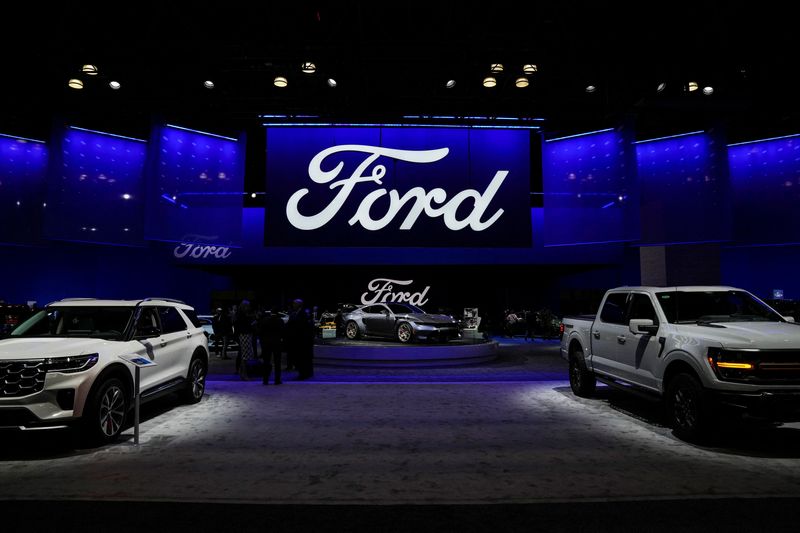
By Nora Eckert and Nathan Gomes
DETROIT (Reuters) – Ford Motor on Wednesday projected up to $5.5 billion in losses on its electric vehicle and software operations this year, a loss similar to last year and a sign of the severe difficulties in cutting costs on battery-powered models.
The automaker forecast overall profitability for 2025, but even that was lower than in 2024. For the fourth quarter, it reported a net profit of $1.8 billion, up from a loss of $500 million in the year-ago quarter as pension-related costs weighed on results.
The company’s shares were down nearly 5% in after-hours trading.
Ford’s chief executive, Jim Farley, has been seeking to follow up a choppy 2024 with more consistent results, in a year that is already shaping up to be marred by swings in U.S. policy.
The Dearborn, Michigan, automaker is working to overcome persistent quality issues and lift its stock price which declined by 18% last year. It now faces uncertainty around U.S. President Donald Trump’s threatened tariffs on Mexico and Canada. If implemented, the measures would boost the automaker’s raw material costs and likely hurt sales demand.
Farley told analysts on a conference call that Ford could weather a few weeks of tariffs, but that if 25% duties on Mexico and Canada were prolonged, “it would have a huge impact on our industry, with billions of dollars of industry profits wiped out, and adverse effect on the U.S. jobs.” Farley added he believes that Trump is aiming to strengthen the auto industry, not weaken it.
The company’s fourth-quarter revenue of $48.2 billion surpassed analyst expectations of $43 billion, according to LSEG data. Adjusted earnings per share of 39 cents also beat analyst forecasts of 33 cents per share.
Farley made some significant cuts to the company’s EV plans last year, axing a much-anticipated three-row electric SUV and delaying the launch of its next generation electric F-150 Lightning truck. The company is leaning heavily on its California “skunkworks” team developing EVs from the ground up, and said the first affordably priced vehicle from that team will be a mid-sized electric pickup arriving in 2027.
While Ford is not rolling out new EVs in the coming year, a contrast to General Motors which is introducing a blitz of new models and ramping up sales of its Blazer and Equinox EVs, Farley is leaning heavily on hybrids, which GM is not rolling out until 2027.
Ford’s EV losses include significant investment in future models, and it is also increasing volume while cutting costs by $1.4 billion, said Sherry House, Ford’s incoming chief financial officer.



